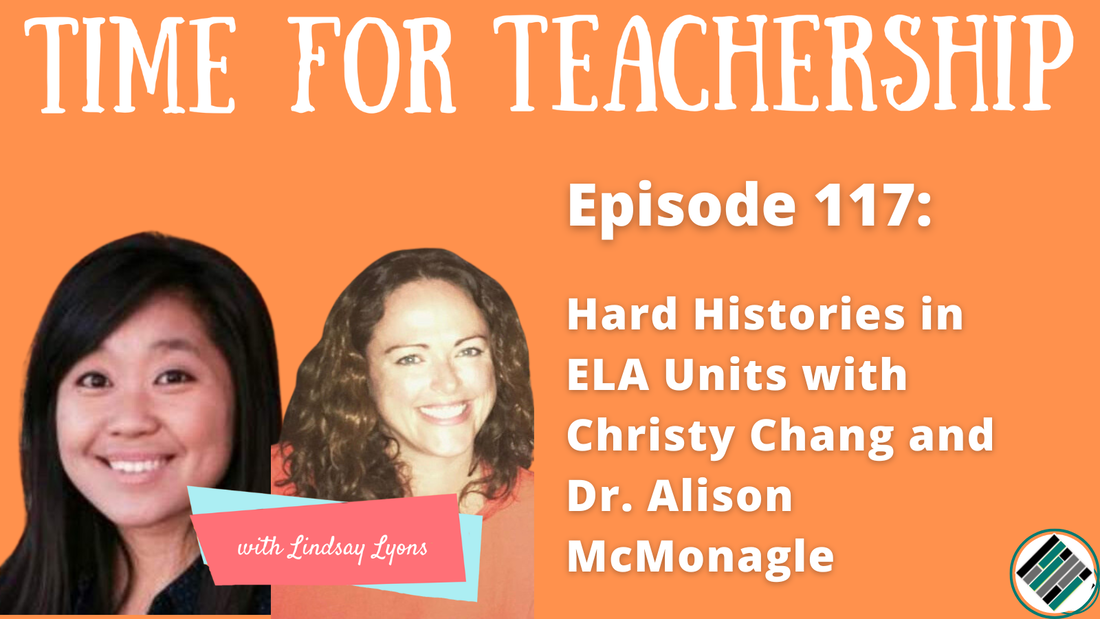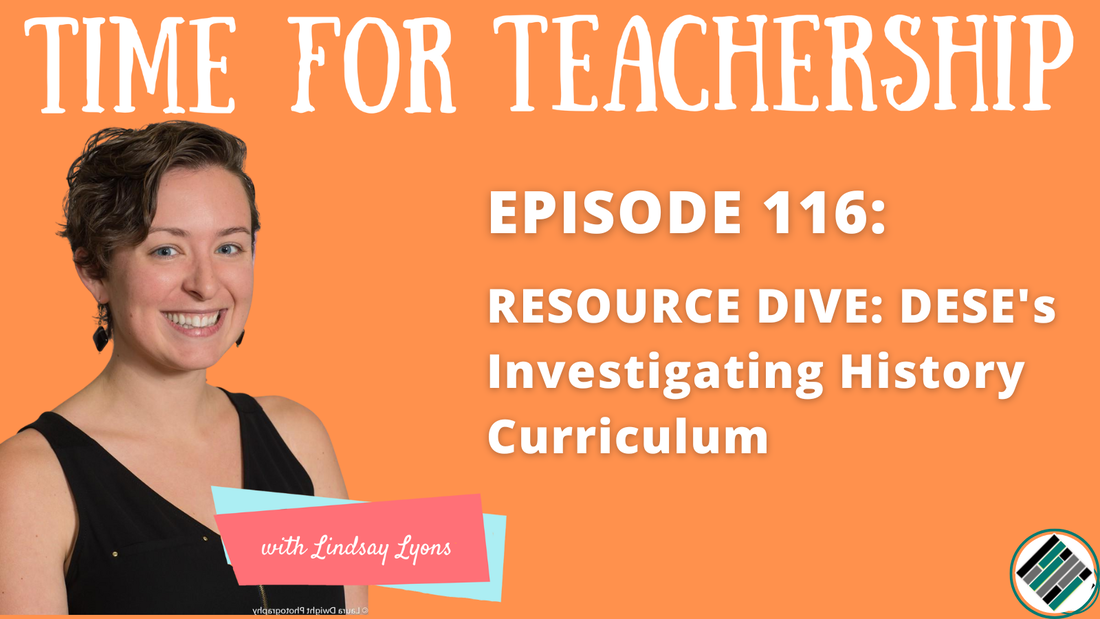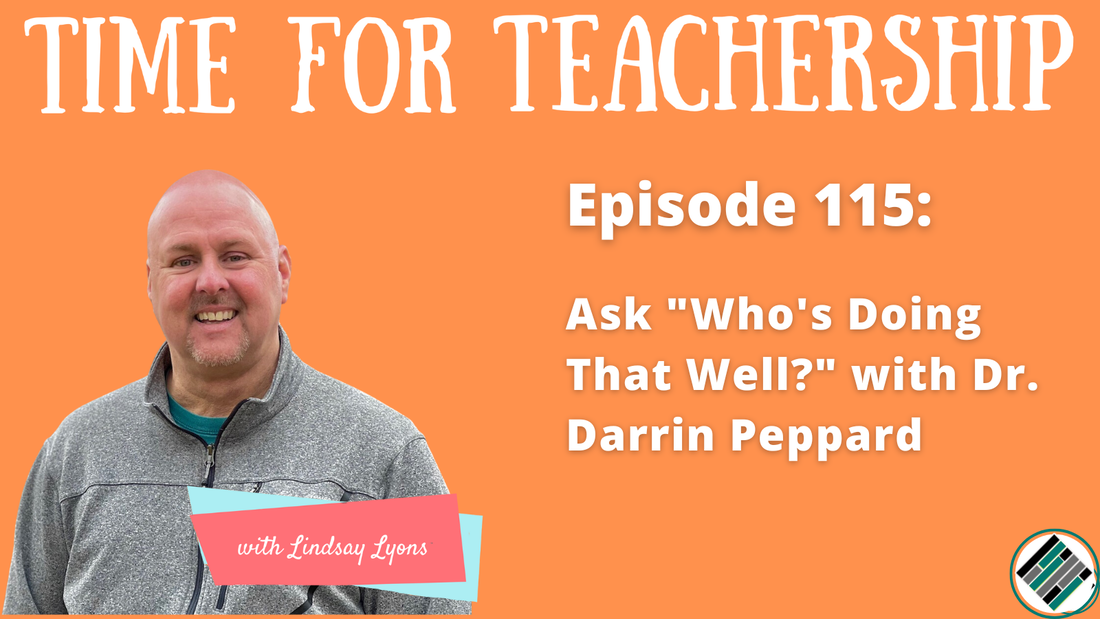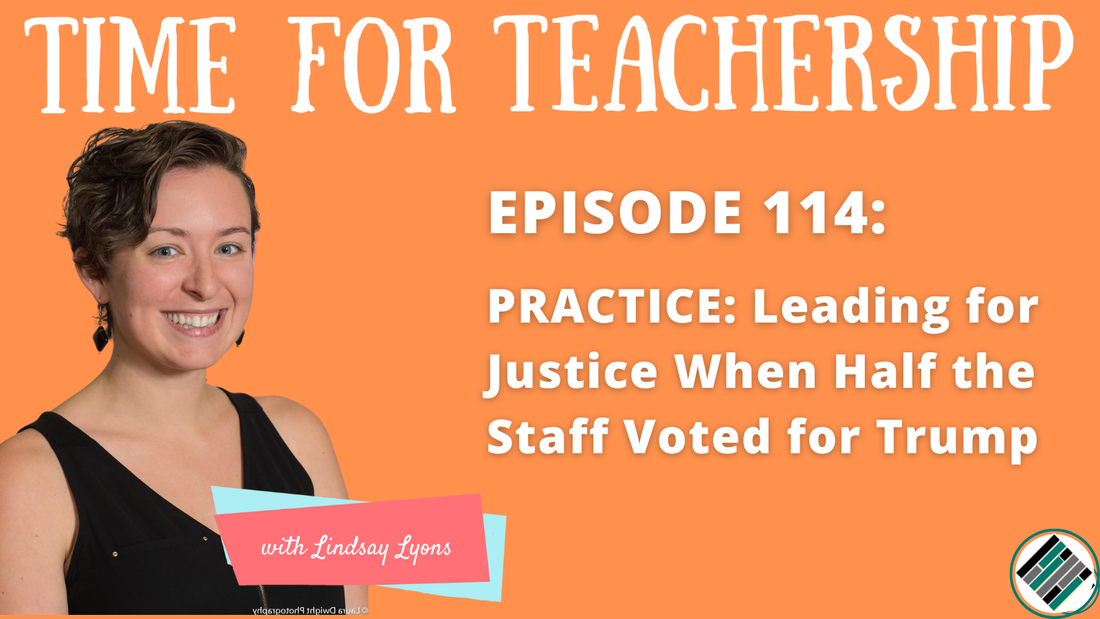
Listen to the episode by clicking the link to your preferred podcast platform below:
I met today’s guests at the 2022 NCSS Conference when I attended their session on elevating and prioritizing teaching hard histories in the ELA classroom. Both curriculum specialists for the school district of Philadelphia—which includes about 250 schools—Christy primarily works with middle schools and Alison primarily works with high schools.
The Big Dream Christy’s dream is that all students can access grade level texts, and they are on the way to achieving that dream soon! In addition to Christy's dream, Alison’s dream is autonomy for students and teachers to make the best choices for their needs. Alignment to the 4 Stages: Mindset, Pedagogy, Assessment, and Content The culture of partnership seems to be in place in many places. Leaders share the vision of partnership. Sometimes it doesn’t happen in the way it’s envisioned. Paraphrasing Dr. Ibram Kendi, Christy shared that racist policies lead to individual racism, not the other way around. The hope is personal mindsets will shift when we introduce new curriculum and have honest conversations as educators wrestle with it. There is a legacy of heavy-handedness around pedagogical practices, so there is a bit of fear around having the autonomy to do things differently than they’ve been done in the past. Another tension is due to emergency certifications and the larger context of teacher training, teachers may not have been equipped with the tools they need to be culturally responsive to the needs of their students. Christy shared an analogy: We’re not trying to give people overwhelm with a bunch of dieting recommendations, we’re saying eat nourishing meals and eat a walk every day. We’re not inventing something brand new. We’re trying to take away some things that were added to teachers’ plates that were not helping teachers and students. Action Steps The simplified goal: Read good books. Talk about them. Write about them. Curriculum Created: For each unit, we share a core text and provide daily lesson guidance documents, which includes core components of a reading or writing lesson. Each unit comes with an overview, which includes Essential Questions, big ideas, and alignment to Dr. Gholdy Muhammad’s HILL model (5 pursuits). Step 1. Try to align ELA novels and texts to grade-level History units and content. Step 2. Choose culturally relevant texts. Choose one canonical text and teach it critically. Step 3. Develop lesson guidance, not lesson plans. (This enables teacher autonomy and offers opportunities for personalization in response to students’ identities in each classroom.) Lesson guidance includes things like: an opening, mini lesson, shared reading, discourse, write in response to reading). Step 4. Develop a writing-based summative assessment (multimodal writing or traditional writing). Recommendations for Leaders Doing Similar Work An Approach to Implementation Challenges: Particularly in high school, teachers are often attached to the texts they’re teaching. There’s some sticky spaces around that. They’ve pushed it back to schools to determine what they were comfortable with and what their students needed with the lens of Am I just falling back on what I know? Am I pushing myself? They’ve learned to trust schools and leaders to make those decisions and honestly communicate when that’s a struggle. Being open to the conversation is critical. Not Starting From Scratch? If you’re working with existing resources, there is still room for shifts. ”We think that novel-based units are the way to go…We start with the premise that there is no wrong text to teach in a classroom. It’s how you teach it.” We have to work within our locus of control. For example, if there’s a short story with problematic messaging, relate it to the identities present in the classroom (the teacher’s and the students’ identities), and determine how to talk about the text. Positive Deviance: Parable of the Sower and Sula units were made and previously taught by teachers prior to this district-wide curriculum design work. These units were already received well, so it became part of the standard curriculum. In fact, all units were designed by teachers and coaches in the district, which helped build trust in the curriculum. Book “Home Runs” for Students: The Poet X by Elizabeth Acevedo and Born a Crime by Trevor Noah One Step to Get Started Shift conversations about ELA instruction to building knowledge. Books teach us about the world. What knowledge are we choosing to build? How is that built by the books we teach? Skills are very important to reading and writing, but without knowledge, they are kind of useless. There’s a lot of research on this coming out now! Stay Connected You can connect with Christy via email at [email protected]. You can find Alison on LinkedIn. You can also find the School District of Philadelphia’s secondary ELA curriculum here. To help you begin to think about leading teams to create new curriculum, I’m sharing my Curriculum Boot Camp Planner with you for free. And, if you’re looking for more details on the ideas in this blog post, listen to episode 117 of the Time for Teachership podcast. If you’re unable to listen or you prefer to read the full episode, you can find the transcript here. Quotes:
If you enjoyed this episode, check out my YouTube channel where I explain how to talk about current events with your staff:
0 Comments

Listen to the episode by clicking the link to your preferred podcast platform below:
DESE is releasing their new (free) Investigating History curriculum for grades 5, 6, and 7 in the 2023-24 school year. In this episode, I walk you through what’s in the curriculum and how you can support your teachers to engage with the curriculum and prepare to teach it to their students in a relevant, personalized way.
Why I Like It and the Research It’s Based On: It’s grounded in justice-centered research and frameworks. The 4 Instructional Principles:
The 3 Pillars:
Content Covered in Each Grade: *Note: This curriculum is constantly evolving based on feedback from students and teachers, so this is the outline as of this episode’s recording (March 27, 2023). Grade 5:
How to prepare teachers to engage with this curriculum and prepare to teach it? Suggested outcomes for a professional learning experience:
Leading Curriculum Implementation Tip: Co-create ongoing structures of coaching support, success shares, and resource banks. For reference: DESE’s Design Specifications document for the Investigating History curriculum. To help you get started with preparing teachers to teach this curriculum, I’m sharing my Investigating History PD Agenda with you for free. And, if you’re looking for more details on the ideas in this blog post, listen to episode 116 of the Time for Teachership podcast. If you’re unable to listen or you prefer to read the full episode, you can find the transcript here. Quotes:
If you enjoyed this episode, check out my YouTube channel where I reveal an instructional strategy and how to build community:

Listen to the episode by clicking the link to your preferred podcast platform below:
Dr. Darrin Peppard is a leadership coach, consultant, and speaker focused on organizational culture and climate. He’s the author of Road to Awesome and continues to be an educator at heart.
The Big Dream Every adult and kid in a school feels seen and valued and heard. Every single kid has an opportunity for a better tomorrow and to figure out what they’re interested in. No one gets put in a box. Mindset Shifts Required Develop portraits of a learner instead of portraits of a graduate! We can lead from the middle or the back. We don’t always need to lead from the front. Help teachers see what’s possible and give themselves permission to teach in innovative ways. Action Steps Hand over the curriculum decisions to teachers (e.g., to align curriculum and instruction to their three academies: Health, Energy, and Fire, Law, and Leadership). Dr. Peppard had three incredible leaders leading those academies, and just let them go. Of course, he was still in their classrooms all the time, but they led them. Protect and shield your staff from outside (and sometimes even inside) forces so they can do their work. Build a groundswell of interest. It can’t just come from just you; it’s gotta come from staff. Put a team together and invite someone who’s not an early adopter. Visit other schools doing great work with teachers. Ask: Who’s doing that well? Invite students from other schools doing the work you want to do to talk to your students and families. One Step to Get Started Have a vision. Be clear about that vision. What’s the shift in reality you want to see in your school for your kids? You can then make decisions about where to allocate your time and resources to make it happen. Stay Connected You can find this week’s guest on www.roadtoawesome.net or @DarrinMPeppard on social media. You can get the revised edition of Dr. Peppard’s book here. To help you be the best leader you can be, Dr. Peppard is sharing his free ebook on 5 mindsets to level up your leadership. And, if you’re looking for more details on the ideas in this blog post, listen to episode 115 of the Time for Teachership podcast. If you’re unable to listen or you prefer to read the full episode, you can find the transcript here. Quotes:
If you enjoyed this episode, check out my YouTube channel where I explain how to co-create community values and agreements:

Listen to the episode by clicking the link to your preferred podcast platform below:
Leaders, if you need to navigate challenging staff and/or larger community contexts or disagreements.
Origins of this Episode Leadership Coaching Question: How can we work with differing opinions among staff or between administrators and families? (How do you arrive at a common understanding?) Another Leadership Coaching Question : How can we bring our DEI team’s “theory” work to the whole staff in a practical way? What Can We Do? First, some grounding context: Upholding the dignity of all people and advancing justice are the goals. We can’t lose sight of those. Facts matter. Scholars, Diana Hess and Paula McAvoy distinguish between settled empirical issues (these are factual realities and we don’t debate them) and policy issues (we can debate what’s the best way forward). Action Step: Ground the work and discussions in shared values. In processing injustices and conflict, center human emotions and “BASE” needs (i.e., (belonging, autonomy, survival, and enjoyment) instead of personal opinions. When we disagree, if we can identify the underlying value that’s the reason that we take our specific position, it’s more likely we can connect and hear the other person. For example, if someone says the value that underlies my position is that I am afraid for me or my family’s safety. That is something we can likely all resonate with to some degree. Tip: If you haven’t already identified shared values as a staff, I recommend doing this as your next meeting activity! (You can get a sample agenda for such a meeting here.) Action Step: Collect data on students’ experiences and center staff conversations in “street data.” (Check out the book, Street Data, by Jamila Dugan and Shane Safir!) Action Step: Invite students to staff meetings and have students on leadership teams as much as possible. Action Step: Use staff meetings to practice via protocols staff can also use with students, families, teams, and/or community members, depending on their role. What’s in the 4 Staff Meeting Agendas Freebie? .
Tip: Check out the 5-minute videos for each of these available on YouTube. Sneak Peek: Next month on the podcast, we’ll be starting a brand new #UnitDreaming series featuring educators who create a justice-centered unit outline right on the show! To help you do this work with your staff, I’m sharing my Staff Meeting Agendas with you for free. (You’ll get one agenda per week for a month. Yes, slide decks and live links to all related resources are included!) And, if you’re looking for more details on the ideas in this blog post, listen to episode 114 of the Time for Teachership podcast. If you’re unable to listen or you prefer to read the full episode, you can find the transcript here. Quotes:
If you enjoyed this episode, check out my YouTube channel where I explain how to diagnose an adaptive challenge:
Listen to the episode by clicking the link to your preferred podcast platform below:
Author of Open Windows, Open Minds: Developing Antiracist, Pro-Human Students, Afrika Afeni Mills is back on the podcast! Afrika wants to build community and help folx keep their chins up through this challenging work.
The Big Dream
For us as educators to be courageous and strategic. (The kids are doing it, but they shouldn’t be alone doing it!) Mindset Shifts Required White-identifying people should do antiracist work for themselves. All people want to be whole and healed. We can look to white antiracist role models as guides and for motivation and encouragement to do this work. Many white folx have heard they need to decenter themselves, and so they may lean back. Instead, we can offer an alternative way to be. There’s a nuance to decentering. It doesn’t mean silence or to not be represented at all. It means what’s beautiful should be represented. Young white-identifying children don’t have great books to learn about people who look like them that have been doing antiracist work (both in the past and the present). Caterpillar to Butterfly Metaphor: The hard transformation happens in the chrysalis, and we can’t open it up early or the caterpillar will die. Actions Educators—Specifically White Educators—Can Take Pause and reflect. (Engage in these activities as you read Afrika’s book!) Write an obituary of the way we used to believe something. It’s hard to face this stuff! Write a letter to your younger self as part of your racial healing. Maybe even create a story to share with your students based on your story. Do these things to understand our own foundations and how things got to be the way they are before taking action. This will sustain the work. Leaders: Make space for teachers to 1) Do racial healing and identity work, and 2) Take action with students. Do this work yourself too! One Step to Get Started Use a framework. A great, free example is the CARE Framework! Also: Give teachers space to do this. Partner with families. Have the will to do it, have a plan for how we’ll keep this work going in the face of inevitable resistance. Stay Connected You can find this week’s guest on www.afrikaafenimills.com, on Twitter, Instagram, Facebook, and LinkedIn. Referenced Links:
To help you do anti-racist, pro-human, healing work, Afrika is sharing an amazing resource-packed Padlet with you for free. And, if you’re looking for more details on the ideas in this blog post, listen to episode 113 of the Time for Teachership podcast. If you’re unable to listen or you prefer to read the full episode, you can find the transcript here. Quotes:
If you enjoyed this episode, check out my YouTube channel where I explain how to revolutionize behavior management in school:
|
Details
For transcripts of episodes (and the option to search for terms in transcripts), click here!
Time for Teachership is now a proud member of the...AuthorLindsay Lyons (she/her) is an educational justice coach who works with teachers and school leaders to inspire educational innovation for racial and gender justice, design curricula grounded in student voice, and build capacity for shared leadership. Lindsay taught in NYC public schools, holds a PhD in Leadership and Change, and is the founder of the educational blog and podcast, Time for Teachership. Archives
May 2024
Categories |

 RSS Feed
RSS Feed